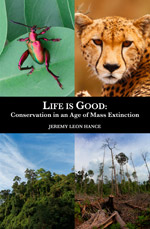
Color edition - Click to enlarge
CONTENT
| Introduction: the life emergency |
| 1. Meeting Tam in Borneo: our last chance to save the world’s smallest rhino |
| 2. Will jellyfish take over the world? |
| 3. Why top predators matter |
| 4. The camera trap revolution: how a simple device is shaping research and conservation worldwide |
| 5. Nature’s greatest spectacle faces extinction |
| 6. The penguin problem, or stop eating our fish! |
| 7. What about the ugly ones? |
| 8. Zoos: why a revolution is necessary to justify them |
| 9. The end of the oceans: from bounty to empty |
| 10. Language and conservation: why words matter |
| 11. Saving the world’s weirdest mammal |
| 12. Shifting baselines: forgetting the lost |
| 13. Gone: extinction over the past decade |
| 14. The anaconda and the fer-de-lance: one day on Suriname’s jungle coast |
| Citations |
| About the Author |
| Publication Date | Jan 22 2012 |
| ISBN | 1468012509 |
| EAN13 | 978-1468012507 |
| Page Count | 214 |
| Trim Size | 5.25" x 8" |
In a series of essays, Jeremy Leon Hance, environmental reporter with mongabay.com, explores the challenge of mass extinction and the different ways conservationists, with limited support and funds, are rising to meet it. The essays focus on a wide-variety of topics including efforts to save long-ignored endangered species, such as an ancient venomous rodent; recent research vindicating long-reviled predators, like wolves and lions, as key to an ecosystem's harmony; the rise of the camera trap, a humble new tool that's photographing rarely seen species; and a new theory on how humans view, and even forget, wilderness.
This thought-provoking book raises the question: as the biodiversity crisis spreads from the rainforest canopy to the deepest ocean, how will the world's cleverest species act?
Update: In 2012, Life is Good earned a starred review from Publisher's Weekly, a top book reviewer for the publishing industry.
BUYING OPTIONS
|
PRINT Amazon.com $10.95 Amazon.com [Europe/UK] £6.92 CreateSpace $10.95 |
ELECTRONIC Kindle $4.99 Kindle [Europe/UK] £3.09 |
Bulk orders
Discounts are available on bulk orders. Please contact mongabay for more information on bulk orders.
ABOUT THE AUTHOR:
Jeremy Leon Hance has been writing for mongabay.com since 2007. He graduated from Macalester College with a major in English and from St. John’s College in Santa Fe with a Masters Degree in ‘the Great Books’. He lives in St. Paul, Minnesota with his wife, Tiffany; his daughter, Aurelia; and his miniature Schnauzer, Oz.
PRAISE FOR MONGABAY.COM
“Mongabay is the pre-eminent, go-to website for rainforest issues. The articles are always well-researched, well-written, and insightful. Whether you are doing research for a school research paper, looking for cool info on weird jungle creatures, or investigating a corporation that might be harming the tropical environment, Mongabay is ALWAYS the place to start!”
-
Mark J. Plotkin, Ph.D., L.H.D.
President Amazon Conservation Team
Author, “Tales of a Shaman’s Apprentice”
-
William F. Laurance, Ph.D.
Distinguished Research Professor & Australian Laureate
Prince Bernhard Chair in International Nature Conservation
Centre for Tropical Environmental & Sustainability Science,
School of Marine & Tropical Biology, James Cook University
ENVIRONMENTAL IMPACT
Life is Good is printed on-demand, meaning books are only produced as they are ordered, which reduces excess production and waste. Life is Good is printed on acid-free paper stock supplied by an FSC-certified provider. In order to reduce its ecological footprint, Life is Good does not use glossy paper for interior pages.